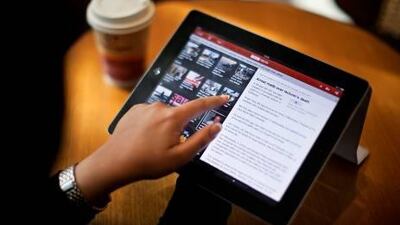The magic starts the moment you lift a corner of the cover. The screen flicks on, ready. Let go of the cover and it whips magnetically back into place with a click. It's simple, but satisfying. It's responding to you alone. It's yours.
It's an iPod touch, all grown up, an iPhone that's all 'I' and no phone. And Apple's second iteration of the iPad is the best embodiment yet of a new paradigm in computing: the invisible device.
Forget box, screen, mouse and keyboard, operating systems and pull-down menus, all those layers between you and what you want to do.
The invisible device is a single, bald sheet of glass, a dumb receptacle for apps. Each app turns it into a different, single-use device - browser, radio, calculator, magazine. The computer - tablet or smartphone - is the apps.
On a tiny screen, there was only so much apps could do. They were great for a quick check, naming that song with Shazam, or converting a currency.
But anyone with a smartphone, even the giganto-screened Android monsters, will be familiar with a sense of constraint.
Web pages were blown-up fragments, apps and mobile-specific sites little more than lists of menu options. You knew there was more beyond those narrow horizons.
The tablet shifts the perspective. Poky becomes panoramic. Websites are whole and usable in a way they never were on smaller devices. One frame becomes many as you flick and tap through a far richer experience.
Faster, too. The processor is twice as fast as the first iPad, with nine times the graphics grunt. Apps scroll and switch in an instant, and the computer retreats still further into the background.
Although the device's body isn't that much smaller than its predecessor, it feels thin and light enough to all but melt away. It is, simply, the most natural, intuitive device I've used.
And the games. Oh, the games. Fun as it was to while away the minutes in a bus queue while holding your iPhone, the device's tiny screen made it an unsatisfying gaming experience.
It's no coincidence that the game I play most on the iPhone, Tiny Wings, has but a single control. You're either pressing the screen or not, and it doesn't matter where; much more on that little space becomes fiddly. (Another favourite, Cut the Rope, requires precise strokes that are frequently cursed by inaccuracy.)
Not on the iPad. So far, the standout is World of Goo, a cartoonish nightmare that requires the player to construct intricate towers of snot. On an iPhone it would be unbearably imprecise and frustrating. On the iPad, it's perfect (if icky).
Movies look lovely, too, but beware: they're not cheap to buy or rent from iTunes, and high-definition files acquired from elsewhere seem not to play well. Perhaps that's a snag that can be overcome; for now, it seems to be the limitation of a processor geared for battery life, not speed.
There will be other tablets, many others. Samsung has been first with the Galaxy Tab, a 7-inch Android machine; it plans to follow it soon with larger, thinner versions that compete more squarely with the iPad.
RIM, which makes the BlackBerry, will launch its 7-inch PlayBook within months, while HP plans to release various sizes of TouchPad, all of which will run on Palm's WebOS system. Many of the dozens of tablets that dominated this year's CES, a technology trade show in Los Angeles, won't make it to market, but many others will. So far, none is as thin or as functional as the iPad, but they will be, with sharper screens, more memory, more wow. Apple will have to stay sharp.
But the device is the apps, and the apps, for now, are on the iPad. The sheer volume of iPad users - about 15 million of the first version were sold, and this one will surely surpass that - will push developers to focus first on the iPad, making Android and its also-ran rivals an afterthought.
It's the same market skew that punished Apple for decades, as software was written for Windows alone, at the expense of the less popular Mac.
Developers will favour the simplicity, too. There are only two basic types of iPad, the old and the new, and both have essentially the same screen.
Contrast that with freewheeling Android, where devices can have whatever type of screen the manufacturers please; developers, then, must struggle to make their apps look right on all of them, or fudge it, or release apps that work on only a few. Fewer flavours make for quicker, cheaper software testing, exacerbating the already-huge volume advantage.
But who needs it? For now, really, no one. The critics say it doesn't do anything that your existing devices haven't got covered, and they're right. What's new is the sense of interaction, of involvement.
You'll use it in ways you wouldn't have thought - for the sofa check of the Internet Movie Database as you watch a film, or propped up in the kitchen for a recipe. In three weeks, it's taken over many duties from the laptop and the iPhone, and there will doubtless be more.
None is unique, or essential - they're just more personal, more intimate, more yours.
So no, you don't need this, not yet, and it's hard to justify spending money on a device with no obvious, essential use case.
But if you've got an overseas trip coming up and US$500 (Dh1,800) in your pocket - no release date or price has yet been announced for the UAE, but the iPad 2 is already out in the US and will be in 25 more countries this weekend - you won't regret it.

